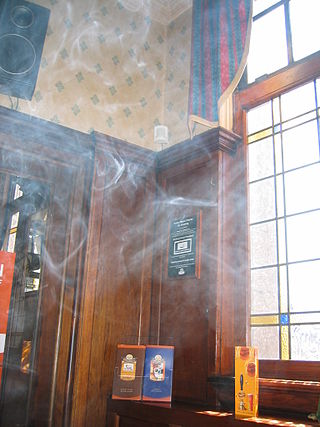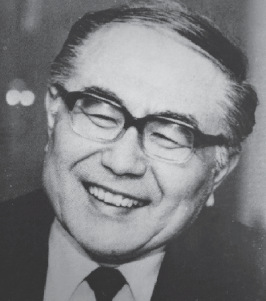Related Research Articles

Altria Group, Inc. is an American corporation and one of the world's largest producers and marketers of tobacco, cigarettes, and medical products in the treatment of illnesses caused by tobacco. It operates worldwide and is headquartered in Henrico County, Virginia, just outside the city of Richmond.

Tobacco smoking is the practice of burning tobacco and ingesting the resulting smoke. The smoke may be inhaled, as is done with cigarettes, or simply released from the mouth, as is generally done with pipes and cigars. The practice is believed to have begun as early as 5000–3000 BC in Mesoamerica and South America. Tobacco was introduced to Eurasia in the late 17th century by European colonists, where it followed common trade routes. The practice encountered criticism from its first import into the Western world onwards but embedded itself in certain strata of a number of societies before becoming widespread upon the introduction of automated cigarette-rolling apparatus.

Smoking bans, or smoke-free laws, are public policies, including criminal laws and occupational safety and health regulations, that prohibit tobacco smoking in certain spaces. The spaces most commonly affected by smoking bans are indoor workplaces and buildings open to the public such as restaurants, bars, office buildings, schools, retail stores, hospitals, libraries, transport facilities, and government buildings, in addition to public transport vehicles such as aircraft, buses, watercraft, and trains. However, laws may also prohibit smoking in outdoor areas such as parks, beaches, pedestrian plazas, college and hospital campuses, and within a certain distance from the entrance to a building, and in some cases, private vehicles and multi-unit residences.
The American Academy of Pediatrics (AAP) is the largest professional association of pediatricians in the United States. It is headquartered in Itasca, Illinois, and maintains an office in Washington, D.C. The AAP has published hundreds of policy statements, ranging from advocacy issues to practice recommendations.

Passive smoking is the inhalation of tobacco smoke, called passive smoke, secondhand smoke (SHS) or environmental tobacco smoke (ETS), by individuals other than the active smoker. It occurs when tobacco smoke diffuses into the surrounding atmosphere as an aerosol pollutant, which leads to its inhalation by nearby bystanders within the same environment. Exposure to secondhand tobacco smoke causes many of the same diseases caused by active smoking, although to a lower prevalence due to the reduced concentration of smoke that enters the airway.
Action on Smoking and Health (ASH) is the name of a number of autonomous pressure groups (charities) in the anglosphere that seek to publicize the risks associated with tobacco smoking and campaign for greater restrictions on use and on cigarette and tobacco sales.

Philip Morris International Inc. (PMI) is an American multinational tobacco company, with products sold in over 180 countries. The most recognized and best selling product of the company is Marlboro. Philip Morris International is often referred to as one of the companies comprising Big Tobacco.
The Tobacco Master Settlement Agreement (MSA) was entered on November 23, 1998, originally between the four largest United States tobacco companies and the attorneys general of 46 states. The states settled their Medicaid lawsuits against the tobacco industry for recovery of their tobacco-related health-care costs. In exchange, the companies agreed to curtail or cease certain tobacco marketing practices, as well as to pay, in perpetuity, various annual payments to the states to compensate them for some of the medical costs of caring for persons with smoking-related illnesses. The money also funds a new anti-smoking advocacy group, called the Truth Initiative, that is responsible for such campaigns as Truth and maintains a public archive of documents resulting from the cases.

Tobacco products, especially when smoked or used orally, have serious negative effects on human health. Smoking and smokeless tobacco use is the single greatest cause of preventable death globally. As many as half of people who smoke tobacco or use it orally die from complications related to such use. It has been estimated that each year, in total about 6 million people die from tobacco-related causes, with 600,000 of these occurring in non-smokers due to secondhand smoke. It is further estimated to have caused 100 million deaths in the 20th century.
Truth is an American public-relations campaign aimed at reducing teen smoking in the United States. It is conducted by the Truth Initiative and funded primarily by money obtained from the tobacco industry under the terms of the 1998 Master Settlement Agreement reached between 46 U.S. states and the four largest companies in the tobacco industry.
The Tobacco Institute, Inc. was a United States tobacco industry trade group, founded in 1958 by the American tobacco industry. It was dissolved in 1998 as part of the Tobacco Master Settlement Agreement.

Tobacco politics refers to the politics surrounding the use and distribution of tobacco.

Inflight smoking refers to smoking tobacco on an aircraft while in flight. While once prevalent, it is now prohibited by almost all airlines and by many governments around the world. The bans on inflight smoking have been imposed in a piecemeal manner around the world beginning in the 1980s. The use of electronic cigarettes is also prohibited on many flights.
Howard Aaron Engle was an American pediatrician and lifelong smoker who was one of the plaintiffs in a class action lawsuit filed against the tobacco industry, in which Engle claimed that he smoked multiple packs of cigarettes daily since he was in college and was unable to quit despite multiple attempts even after contracting emphysema, continuing to smoke until his death.

Proposition 29, the California Cancer Research Act, is a California ballot measure that was defeated by California voters at the statewide election on June 5, 2012.

Regulation of electronic cigarettes varies across countries and states, ranging from no regulation to banning them entirely. As of 2015, around two thirds of major nations have regulated e-cigarettes in some way. A 2023 report by the World Health Organization (WHO) found that 34 countries had banned the sale of e-cigarettes.
The scientific community in the United States and Europe are primarily concerned with the possible effect of electronic cigarette use on public health. There is concern among public health experts that e-cigarettes could renormalize smoking, weaken measures to control tobacco, and serve as a gateway for smoking among youth. The public health community is divided over whether to support e-cigarettes, because their safety and efficacy for quitting smoking is unclear. Many in the public health community acknowledge the potential for their quitting smoking and decreasing harm benefits, but there remains a concern over their long-term safety and potential for a new era of users to get addicted to nicotine and then tobacco. There is concern among tobacco control academics and advocates that prevalent universal vaping "will bring its own distinct but as yet unknown health risks in the same way tobacco smoking did, as a result of chronic exposure", among other things.

Takeshi Hirayama was a Japanese cancer epidemiologist and anti-tobacco activist who served as the chief of the epidemiology division at the National Cancer Center in Tokyo from 1965 until 1985. He has been credited with publishing the first study linking passive smoking to lung cancer, and also conducted research on the relationship between certain dietary factors and cancer.

Truth Initiative is a nonprofit tobacco control organization "dedicated to achieving a culture where all youth and young adults reject tobacco". It was established in March 1999 as a result of the Tobacco Master Settlement Agreement between the attorneys general of 46 states, the District of Columbia and five United States territories, and the tobacco industry. Truth Initiative is best known for its youth smoking prevention campaign. Its other primary aims include conducting tobacco control research and policy studies, organizing community and youth engagement programs and developing digital cessation and prevention products, including through revenue-generating models. The organization changed its name from the American Legacy Foundation to Truth Initiative on September 8, 2015, to align its name with that of its Truth campaign. As of 2016, the organization had more than $957 million in assets and a staff of 133 based primarily in its Washington, D.C., office.
The Foundation for a Smoke-Free World is an organization focused on smoking harm reduction founded in 2017. In May 2024, it changed its name to Global Action to End Smoking. The World Health Organization (WHO) urged not to collaborate with this front organization of the tobacco industry.
References
- ↑ Kress, E (2004). "Flight Attendant Medical Research Institute (FAMRI)". Tobacco Control. 13 (Suppl 1): i67–i69. PMC 1766152 . PMID 14985620.
- ↑ "SETTLEMENT AGREEMENT; BROIN VS. PHILLIP MORRIS INC., ET AL." Council for Tobacco Research. Bates no. 70063347/3379. October 9, 1997. http://legacy.library.ucsf.edu/tid/mje07c00 Archived 2011-04-29 at the Wayback Machine .
- ↑ "FAMRI Grantees 2012" (PDF). Archived from the original (PDF) on March 4, 2016.
- ↑ "Medical research institute". milliondollarlist.org. Archived from the original on 4 March 2016. Retrieved 23 December 2016.
- ↑ "Famri". hopkins-famri.org. Archived from the original on 5 June 2013. Retrieved 23 December 2016.
- ↑ "Broin". archive.tobacco.org. 23 December 2016. Archived from the original on 24 December 2016. Retrieved 23 December 2016.